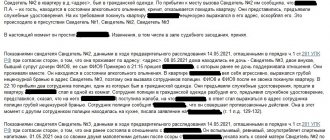What is considered an insult
There is no separate law on insults on social networks that would provide clear terms and clear responsibility. Therefore, each Internet user can decide for himself what may offend and annoy him. However, not every action that hurts the feelings of another person can be punishable. The law provides sanctions for certain offensive acts:
| branch of law | violation (article of law) | punishment |
| criminal law | libel (Article 128.1 of the Criminal Code of the Russian Federation) | fine up to 5,000,000 rubles. compulsory work up to 480 hours |
| violation of privacy (Article 137 of the Criminal Code of the Russian Federation) | fine up to 300,000 rubles. imprisonment up to 4 years | |
| hooliganism on the Internet (Part 1 of Article 213 of the Criminal Code of the Russian Federation) | fine from 30,000 to 500,000 rubles. imprisonment up to 2 years | |
| incitement to hatred, humiliation of human dignity (Article 282 of the Criminal Code of the Russian Federation) | fine from 300,000 to 600,000 rubles. imprisonment up to 6 years | |
| administrative offenses | insult on the Internet (part 2 of article 5.6.1 of the Code of Administrative Offenses of the Russian Federation) | fine from 3000 to 5000 rubles. |
| incitement to hostility (Article 20.3.1 of the Code of Administrative Offenses of the Russian Federation) | fine from 10,000 to 20,000 rubles. arrest up to 15 days | |
| petty hooliganism (parts 3, 4, 5 of article 20.1 of the Code of Administrative Offenses of the Russian Federation) | fine from 30,000 to 200,000 rubles. arrest up to 15 days | |
| civil law | dissemination of information discrediting honor, dignity and business reputation (Article 152 of the Civil Code of the Russian Federation) | refutation of information, recovery of compensation for moral damage |
| protection of a citizen’s image (Article 152.1 of the Civil Code of the Russian Federation) | forced removal of photographs, recovery of compensation for moral damages | |
| publication of data about a person’s private life (Article 152.2 of the Civil Code of the Russian Federation) | forced deletion of information, recovery of compensation for moral damage |
An offensive and humiliating form should be considered the comparison of a person with animals, objects, negative literary characters, the attribution of negative character traits, anomalies in physical or mental development, the targeted use of abusive and other profanity.
All these atrocities can be carried out, including through social networks. These actions are no different from those actions that are committed in private communication or in public, except for the severity of the consequences. And also the following difficulties often arise:
- it is not always possible to understand texts, drawings, videos and others as unambiguously as spoken words or gestures in their natural form, “live”;
- how to identify the offender;
- how to document an unfriendly attack.
How to distinguish private from public
The Internet environment does not mean that it is always a public space.
For example, there are closed accounts, limited access to pages, communication in instant messengers, for example, Viber, in email services, etc. This is a personal sphere.
If information (be it audio, video, printed, photographic format) can be seen by an indefinite number of people or a limited number of users (according to some principle of access), but their number is measured in tens, hundreds, then this is already a public status. It doesn’t matter how many people actually saw the threats and insults.
The degree of a person’s offense, as well as possible punishment measures, depends on the format of information transfer - individual or public.
As a rule, liability for public humiliation is more severe than action in private.
How are they transmitted?
Negative information can be transmitted in various ways:
- as text;
- video messages;
- sound files;
- Images.
The authorship of bad information can be:
- when the offender himself composed, drew, filmed;
- borrowed, redirected. For example , there was an insult from a specific user on VK in the form of a bad repost in a personal message to a specific user.
The defamatory action itself comes from:
- with direct meaning;
- veiled;
- unconsciously. Let’s say a person speaks unflatteringly about some nationality, not realizing that the one to whom the message is addressed belongs to this nation;
- from a specific person;
- anonymously;
- personally addressed (both in public and private form);
- distributed among a group of people;
- other.
Let's draw conclusions
Insult is an indecent word, especially if written with a space.
Instead of drawing a conclusion, I would rather quote another phrase from the decision of the mentioned Supreme Court of the Altai Republic:
“From the case materials it follows that the applicant’s request for the need to conduct a forensic linguistic examination of the phrase expressed by A.A.B. addressed to K.A.V., was considered by the judge of the district court, and a reasoned ruling was made on the refusal to conduct this examination, since, according to the explanatory dictionary of the Russian language by S.I. Ozhegov. the expressed phrase “I wish you to die quickly” is not indecent, does not contradict generally accepted rules of behavior and the requirements of human morality, carries a disdainful attitude and does not require confirmation of this with the help of any special knowledge in this area of life.”
Subscribe to the Telegram channel!
76 539
Discuss on social networks
“What is your evidence?”
There are several ways to confirm the fact of disrespectful behavior. It all depends on how obvious the humiliation was.
1. So, the simplest trick is to take a screenshot of the page where information with defamatory materials is posted.
2. Notarial protocol . It is enough to take a device (mobile phone, tablet, laptop) that displays humiliating information, come to a notary and order a notarization service for information online. The notary, through your device or through his equipment, will go to the unfortunate page and describe what he saw. It will also print it all out on paper as an appendix. And he will draw up a notarial document. In order for this to work, you will need to provide the notary with your address, login and passwords (which, for security reasons, it is better to change later). The disadvantages of this action are the price. For this action, the notary will charge from 4,000 rubles.
3. Demonstration of the device to the official conducting the inspection . If the case is with the police or a lawsuit in court, then the mobile device can be shown to the police officer or the judge. The official will conduct an inspection, find the data and draw up an appropriate protocol (act) on this matter.
4. Contact an expert organization . Currently, there are licensed computer laboratories that can conduct computer research. During the research, they will confirm the content of the information and the fact that it actually came from the slanderer. But it is better to prove violations of your rights not by directly contacting an expert organization, but by asking the court or law enforcement officers conducting the inspection. Such evidence will be more authoritative.
Legal advice
- When someone insults you, remain calm and under no circumstances try to insult the offender in return. It is better to take measures to record the fact of insult.
- Be sure to collect evidence of abuse. This may be audio, video or paper media and witnesses. It is important that the evidence collected is obtained legally and is not fake. Also, all evidence must relate specifically to the case about which the statement will be written.
- It is necessary to contact the court or prosecutor's office as soon as possible, since the statute of limitations for these cases is 3 months.
- If you are insulted at work, it is better to first file a complaint with higher management to conduct an internal review. If no measures have been taken within the company itself, then you can contact the prosecutor’s office or court.
- It is important to remember that simply emotional expressions spoken in a raised tone cannot be considered an insult. It must be obscene insults directed at a specific person.
How to punish a guilty person
Choosing the path to protect your reputation and the method of punishing the culprit depends on how you were insulted.
You need to establish the person itself.
The task is simplified when a person is registered under his own name.
If there is a pseudonym or another person writes from a specific person, then it is difficult to find the ends on your own. For these purposes, they contact law enforcement agencies with a statement of violation of rights. As a result of the investigation, the owner of the IP address where the bad information came from will be identified. If he does not prove that his resources were taken over by strangers, then he will be the guilty party.
If materials are published in Internet media, then the editor takes responsibility, since he dared to publish, although not his own words, but in his publication.
Parents are responsible for minors (in case of civil liability).
Criminal penalty
Criminal sanctions are the most severe of all types of punishment. Therefore, the violation under criminal law is the most gross and daring.
The Criminal Code provides for 4 articles for obscene behavior on social pages.
Hooliganism. This species is very rare. And this is associated with sharp disrespectful statements addressed to a certain person (group of persons). These obscenities are based on political racial, religious or social hostility. And they are expressed by rough comparisons, assumptions, guesses, statements or in the form of profanity. Or relevant images, video/sound materials.
Slander . Intentional transmission of false information on the Internet that undermines a person’s moral, moral, professional image. In other words, this is a slander that negatively affects the reputation of a citizen.
In this regard, a lie expressed to a person in personal correspondence will not be considered slander. That is, where there are no witnesses, when the dialogue is only between two persons.
Invasion of privacy . Here, a simple collection and broadcast of information entering the intimate space is enough. These are facts and events of a closed nature concerning personal and family secrets. That is, what a person hides from society, what is purely personal. Of course, if we are not talking about criminal secrets.
In this case, the offense is not related to knowingly false information. The information is true, the very fact of its disclosure to the public is illegal. After all, every person has the right to their secrets, and disclosing them can cause mental pain.
Humiliation of human dignity . Public behavior by a person that is intended to humiliate another person by belittling or ridiculing him on the basis of gender, nationality, social status or religious affiliation. And also with the aim of inciting hostility towards persons with the corresponding characteristics. A crime will occur when there has already been a fact of bringing to administrative responsibility for a similar offense under the administrative code.
Unlike hooliganism, when the consequences are not important to the offender (the act itself is what matters), with humiliation there is a specific goal - to cause mental wounds to a person (group of people), showing one’s contempt for gender, nation, religion, position, property status. And all this is considered an insult on the Internet under Article 282 of the Criminal Code of the Russian Federation.
How to protect yourself
First of all, the person from whom the negative comes from should clarify what he meant in his sayings. Perhaps there was some kind of subtext, or there was a technical, targeting or other situational error, a misunderstanding of the situation. Perhaps this citizen will apologize and clear up the misunderstanding.
If the circumstances clearly say that there are no “perhaps”, then you can act with confidence and certainty.
We need to collect evidence. That is, to record the fact of a violation, and not just unfoundedly state the essence of what happened to law enforcement officers. How to collect evidence was discussed above.
You can conduct your own small investigation: identify witnesses, other victims of the offender’s affairs, find out his motives, goals, etc.
Well, in order to punish the culprit, you should file a statement about the crime committed:
- to the police under articles 128.1 (slander) and 213 (hooliganism);
- to the investigative committee under articles 137 (interference with private life) and 282 (incitement of hostility).
Sometimes it is difficult to immediately understand what the crime will ultimately be and under what article for insulting a person on social media. networks will attract the offender. Therefore, it is recommended to submit an application in two copies at once: one to the investigative committee, the other to the police at the place of residence of the victim (applicant). Law enforcement officers will understand the situation and determine among themselves whose jurisdiction will be. If everything is obvious, then you need to submit it to a specific structure.
The application itself is written in free form. The main thing is to present the circumstances in detail, refer to the available evidence, which should be attached (for example, a printout of the WhatsApp correspondence, the part where there were unflattering statements, the names of persons who also received offensive messages from the culprit). If there are doubts about how to correctly qualify what has been done, then it is better not to indicate the article number of the criminal law, but simply limit yourself to the phrase “violation of the law,” “infringement of rights,” etc. This will save you from possible counter-accusation of a knowingly false denunciation.
The addresses of territorial police departments and the Investigative Committee can be found on the Internet. This information is open and easy to find.
Administrative
Administrative proceedings are not as serious as criminal proceedings. But their outcome may entail certain sanctions for the violator. And this is not just a fine for insulting people on social networks. There is also mandatory work and even arrest. And in general, administrative punishment in some cases is the first bell before initiating a criminal case.
Insult. That is, belittling a person’s honor in an indecent manner. Often this is ridicule of shortcomings, vices, character traits, life situations involving the victim, his family connections, and lifestyle. Mockery can be made of both real and fictitious things. The victim is hurt precisely by the form in which the offense is expressed: rude, unprincipled, including in the form of obscene language. And also the attitude of the offender towards the person of the offended: disrespect, cynicism, indifference, demonstration of his superiority, etc. The offender, as a rule, has a goal - to cause mental pain and moral distress.
Humiliation . Unlike the previous offense, issues of sexual, racial, religious, and social discrimination come into view. And in general, a rude person may have the intention of arousing hostile sentiments among the mass of people. If a person is prosecuted for this violation, then if the act is repeated, criminal liability will follow under Art. 282 of the Criminal Code of the Russian Federation.
Minor disorderly conduct . This is a disrespectful message to society, the state, the Constitution, the state. power, symbolism. Such criticism is naturally unfounded and undeserved. In this case, the author, instead of expressing his opinion, simply swears. As a result, such presentation of information belittles the dignity of society and its members. At the same time, there is no exact list of obscene language; it is established individually during the consideration of a specific case by law enforcement officers or a judge.
Where to contact
To protect your name and honor, you need to contact the police, the department at your place of residence. But before applying it is recommended:
- find out the identity of the culprit (if the person is familiar to you);
- make sure that what was done came from a specific person. Sometimes actions can be carried out by outsiders who, for example, have taken over someone else’s Facebook accounts. That is, they pretend to be someone else. To do this, you can ask to clarify who the author of such actions is and what his goal is. But be careful, this could be a scenario for scammers who want to steal funds on cards and the like.
- ask whether the offender has any intention of apologizing, making amends, or compensating for the inconvenience. Here, too, you need to be careful, because if you overdo it, your actions can be regarded as blackmail and turned against you.
Then basic evidence is collected so as not to be unfounded.
And then you can write a statement for insult on social networks, which, along with evidence, is handed over either to the police department or sent by mail.
The inspection must be carried out within 3 to 10 days. You will be notified of the results.
Civil responsibility
We can say that the mildest liability for insulting a person on social networks is civil liability. All sanctions come down to practically two consequences:
- stop further actions and eliminate the infringement of the interests of the injured party;
- compensate for losses, compensate for losses.
Most often, civil cases are filed in addition to criminal and administrative investigations. But is it possible to sue for insult on social networks without a police investigation? Yes, this is the discretion of the citizen. Sometimes one monetary compensation is enough. But there are cases when it is difficult to prove the committed acts in a civil court. Or the attacker is unknown and his identity needs to be established using special methods (which are not available to ordinary citizens). Then it is recommended to first contact the police (SC). The results of their checks will be good evidence for the claim.
Dissemination of defamatory information . Fictitious information that harms a person’s image, reputation, business and personal image. The form in which such information is submitted is not particularly important. Whether it is decent or not, rude or delicate, the slanderer’s speech contains obscenities or normative language, it makes no difference. It is the context that matters, that is, what stain will fall on a person, whether his characteristics will change for the worse. There are three points to consider here:
- the violator’s information is not true;
- the person (who is being slandered) allegedly violated the law or moral standards;
- it is presented in a serious sense that detracts from the status of the person.
But if what is said is true, there is no defense against it. There will be no punishment for public insult on social networks. Since this is not an insult, but an ordinary disclosure of information. Of course, if the informer does not present the information in an abusive (or other obscene) form, or this does not concern personal (family) secrets.
Privacy Data Protection . This means collecting information about a person (about his work, personal preferences, property, source of income, place of residence, birth, etc.). The exception is cases when data is obtained through the activities of law enforcement and regulatory authorities, or the person himself has made such information public.
Manipulations with photographs . Use on the Internet, for example, in the Viber messenger, an image in any format (photo, video) without the person’s consent. This question often arises among parents when photos of their children are published.
Naturally, if the image was taken in public places or the person himself gave permission to shoot, then there will be no violations.
What to do
If a person feels that he has been insulted, then his rights can be protected through legal action. To do this, you need to contact the district/city court at the place of residence of the plaintiff (offended person).
Before going to court, it is recommended to try to resolve the issue amicably if the address (method) of contact with the author is known and if the act deserves forgiveness. Although compliance with the claim procedure is not required.
A statement of claim is submitted to the court, a state fee of 300 rubles is paid, and evidence of illegal actions is presented.
The claim itself is written according to the general rules. It is imperative to indicate that honor and dignity are affected and to describe and explain as much as possible how this is expressed.
If you win, the court will prohibit the collection and dissemination of information, or will order the data to be deleted, a refutation will be posted, and an apology will be ordered, including a public one. The execution of a judicial act is controlled by bailiffs. True, the practice is not particularly well established.
Compensation for moral damages is also available. The amount is determined independently depending on the specific circumstances of the case, taking into account the experienced moral suffering of the plaintiff. This is precisely what needs to be specifically confirmed. For the court, specific facts are needed to confirm the fact of the experience.
For example , a person was fired because of defamatory information. Which led to a lack of money and for a certain time (during the period of absence from work) the plaintiff was in need of food, clothing and other household needs. All this affected both physical and mental state. Therefore, a dismissal order, a certificate of lack of income, and the employer’s testimony about the reasons for dismissal will be significant evidence
.
Legislative definition of the term
The term “personal insult” is explained in Art.
5.61 Code of Administrative Offences. According to this, this is a humiliation of the dignity and honor of an individual, which was expressed in an indecent form. Expressing one’s opinion, in contrast to causing offense, has the following characteristics:
- absence of obscene words;
- reasonable disagreement with the expressed point of view;
- protest against the opponent’s behavior;
- a reasonable indication that the opponent is wrong.
An offense inflicted on a person has the following characteristics:
- obscene, abusive expressions;
- emotional speech;
- humiliation of face;
- causing suffering;
- verbal bullying.
Download for viewing and printing:
Article 5.61 of the Administrative Code of December 30, 2001 N 195-FZ (as amended on February 5, 2018)
Example
For clarity, let’s look at two examples of a manager addressing a subordinate.
The first is an expression of opinion, the second is an insult. Example 1. “Dear Nina Platonovna! You didn't complete the work on time. I'm not happy with this. Please finish the project quickly. Otherwise, I will deprive you of your quarterly bonus."
Example 2. “Nina Platonovna, you’re just a fool! You should have submitted the project yesterday! If you don't finish it right now, I'll give you a fine! Get out and work all night, since you didn’t have the brains to do everything before!”








